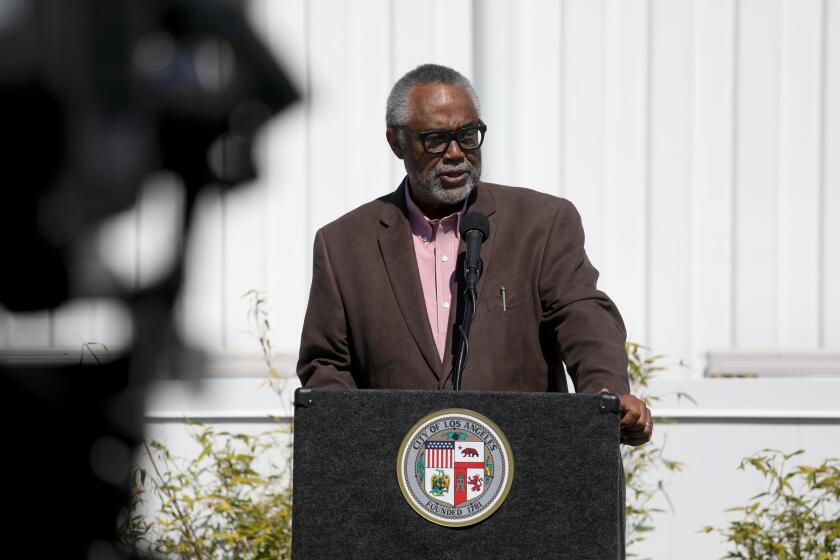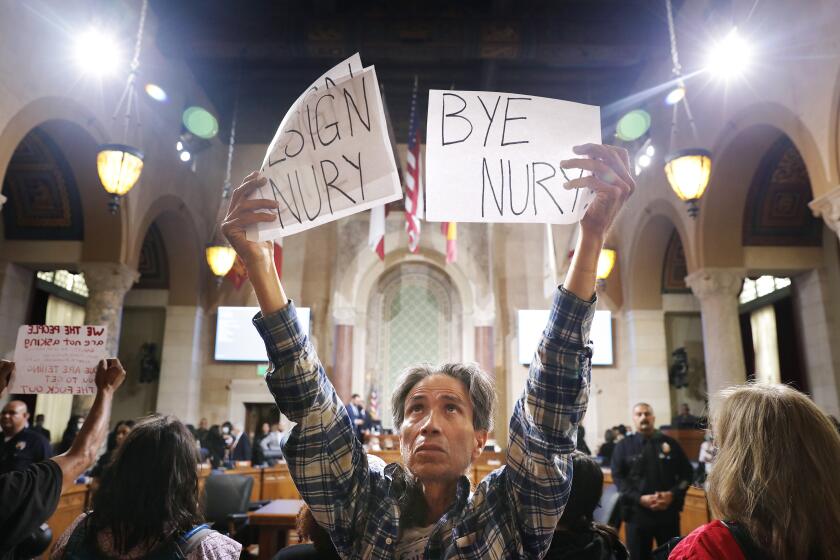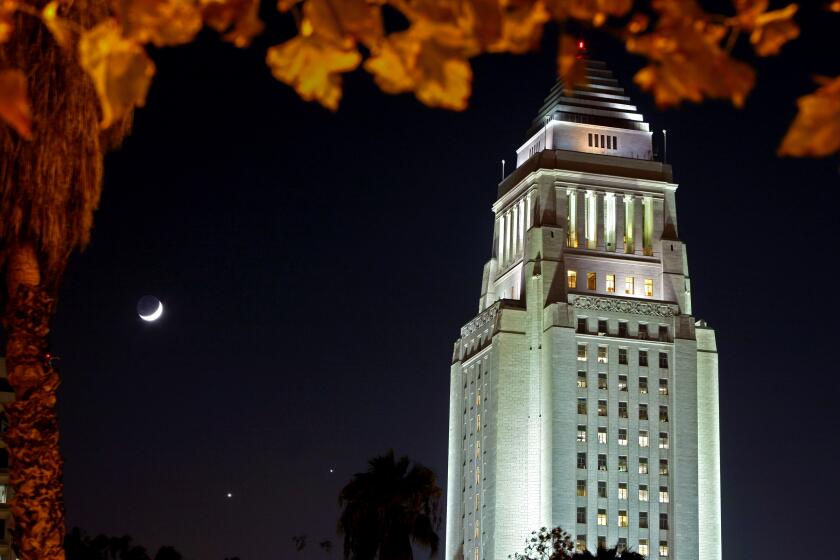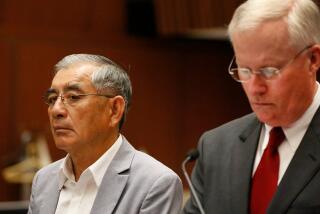Editorial: Again? Another L.A. council member accused of ethical violations
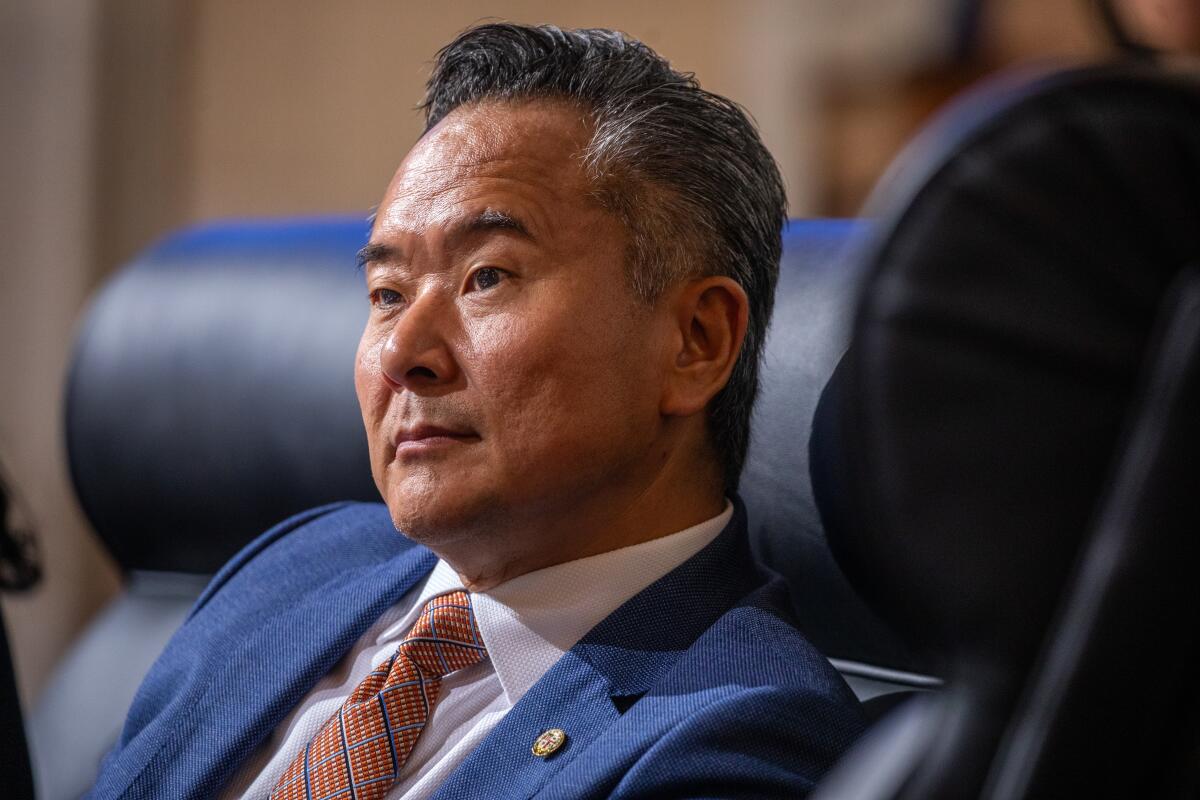
- Share via
Another season, another Los Angeles City Council member accused of ethical violations. The cloud of corruption continues to expand over City Hall.
On Monday, the Ethics Commission accused Councilmember John Lee of accepting gifts in 2016 and 2017 in excess of the limit, failing to disclose those gifts, misusing his city position, and aiding and abetting his old boss, former Councilmember Mitch Englander, in misusing his city position.
Three decades of oversight and enforcement have revealed the commission doesn’t have the independence and authority to be the watchdog that Angelenos need or expect.
Lee is the fifth council member in recent years to become embroiled in an ethics or public corruption scandal, and the second in just the last four months. In June, City Councilmember Curren Price was charged with embezzlement, perjury and other counts related to his office.
It’s tempting at this point to write off City Hall as a cesspool of self-serving politicians who treat ethics, conflict of interest and disclosure laws as mere suggestions. Unlike previous cases, which were brought by the U.S. attorney‘s office and the Los Angeles County district attorney, the accusation comes from within city government — the Ethics Commission. The case will be a test of the city’s political watchdog, which good government groups have argued needs more independence and authority to fulfill its mission.
The accusations arise from Lee’s time as chief of staff to Englander, who pleaded guilty in 2020 to lying to federal investigators when he was caught in a pay-to-play corruption investigation. Lee, referred to as City Staffer B in the federal indictment, was on the now-infamous trip to Las Vegas when Englander received an envelope with $10,000 in a casino bathroom. The trip, we learned from the Ethics Commission’s accusation, was to celebrate Lee’s pending move from City Hall to the private sector.
Editorial: L.A.’s broken government needs change. Voters shouldn’t have to wait until 2032 to get it
2026 or bust. Los Angeles voters will be asked next year to appoint an independent redistricting commission and expand the City Council. But city leaders want to delay implementation of those reforms till 2032.
On that trip, according to the accusation, a developer and a businessperson put Lee up in a hotel suite, gave him $1,000 in casino chips (which, Lee told investigators, he lost playing baccarat), wined and dined him, and spent $34,000 on bottle service at a nightclub. The value of the trip far exceeded the $470 gift limit for city officials.
Lee did not include the trip or gifts on his disclosure forms when he left city service that month. After the FBI contacted Englander around Sept. 1, 2017, as part of its investigation, Englander sent two $422 checks to the businessperson, one from himself, the other from Lee, for “Vegas expenses.” The checks were backdated to Aug. 4 to make it appear that Englander and Lee had reimbursed the businessperson before the FBI inquiry, according to the accusation.
Most City Hall reforms must go to voters. But which reforms should Los Angeles voters consider, and when?
Lee is also accused of not reporting gifts — including dinners, drinks and hostess service — in 2016 and 2017 from the developer and the businessperson. This is a violation of the city’s ethics law, and it amounted to a misuse of his position because Lee knowingly kept the gifts out of the public eye. That gave him an advantage in the 2019 special election to fill the Council District 12 seat after Englander resigned and in 2020 when he ran for reelection, according to the accusation. The federal indictment against Englander was revealed days after the 2020 election.
Lee decried the allegations as “misguided and based on conjecture,” and he suggested — in a rather Trumpian style — that the accusation was timed to “line up with my 2024 re-election.” Lee represents the northwest San Fernando Valley.
The appointed Ethics Commission will decide whether Lee violated ethics laws and, if so, what fines should apply. This will be one of the most high-profile ethics cases in a long time. All eyes will be on the commission, whose members are appointed by the mayor, city attorney, controller, council president and council president pro tempore, and confirmed by the full City Council.
It’s worth recalling that the council recently rejected City Controller Kenneth Mejia’s first pick for the Ethics Commission. That was a stark reminder that the commission’s independence remains tenuous and corruptible when city leaders can choose — or help torpedo — appointees to the commission that will decide whether they have broken the law.
More to Read
A cure for the common opinion
Get thought-provoking perspectives with our weekly newsletter.
You may occasionally receive promotional content from the Los Angeles Times.
